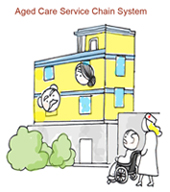In the spring of 2011, seeing the future business opportunity lying in China’s aged care industry from the severe aging problem faced by China, Landsea put forward the strategy of stepping into this sector. In the summer of 2011, Landsea aged Care Business Department was set up. After detailed investigation and comprehensive communication with various aged care agencies at home and abroad, the department collected much detailed information, and established good communication relationships with excellent aged care agencies in advanced countries and regions, which laid a solid foundation for Landsea to explore and practice a green aged care business model.
On August 29, 2012, Landsea held a news conference on its “Deep Green” Strategy. At the news conference, Tian Ming, Chairman of Landsea, explained, “In the next 40 years, the aging population of China will keep growing, and in 10 years time, the common residential housing market will stop growing, but the aged care housing market will grow continuously. At present, the aged care industry is in a fledging period, and there is no mature business model to be copied, so the competition in the aged care industry is actually a competition of profit models. To win the competition, Landsea will, based on the existing real estate development model, green construction technologies, and property management abilities, proactively explore real estate projects and service systems meeting the requirements of the aged. So far, Landsea has set about launching the ‘One Bowl of Soup’ project, ‘Living with Parents’ project and chain services in some projects. In the strategic planning period, Landsea will strive to become the pioneer to explore a mature aged care business profit model in China.”
On November 8, 2012, Landsea Aged Care Investment Management Co., Ltd. was founded to comprehensively push forward Landsea’s green aged care business strategy including carrying out the “One Bowl of Soup” and “Living with Parents” projects, building comprehensive functional aged care communities, and the investment, development and management of the aged care chain service system.
A Bowl of Soup:“the distance of a bowl of soup” is a family harmony theory stated by Japanese scholars in the 1970s when Japan was facing a very serious social problem of the empty-nest family. To solve this problem, Japanese scholars advocated that children should live near their parents so that they could take care of their parents conveniently while having their own spaces at the same time. So they proposed “the distance of a bowl of soup”, meaning the distance between children and parents should be like this, when a bowl of soup is sent to parents by children, the soup is still hot, an analogy of the close relationship between children and parents with independent spaces belonging to each other.
Living with Parents:it refers to a kind of houses where two or more generations can live together but with independent spaces. The spatial design of such houses must consider both the independence and communication, and expand adaptability and flexibility, so that the elderly can live independently and at the same time, their children can take care of them conveniently.

Aged care service chain system:it is a service organization that can provide various chain services meeting the requirements of the aged in the future.
Comprehensive aged care community:it can also be called as sustainable nursing aged community. Such communities provide integrated accommodations and services including self-helping service, care-fit service and nursing service for the elderly, so that no matter in what physical health and ability to care for themselves, they can live in a familiar environment and receive services specially arranged according to their physical conditions.